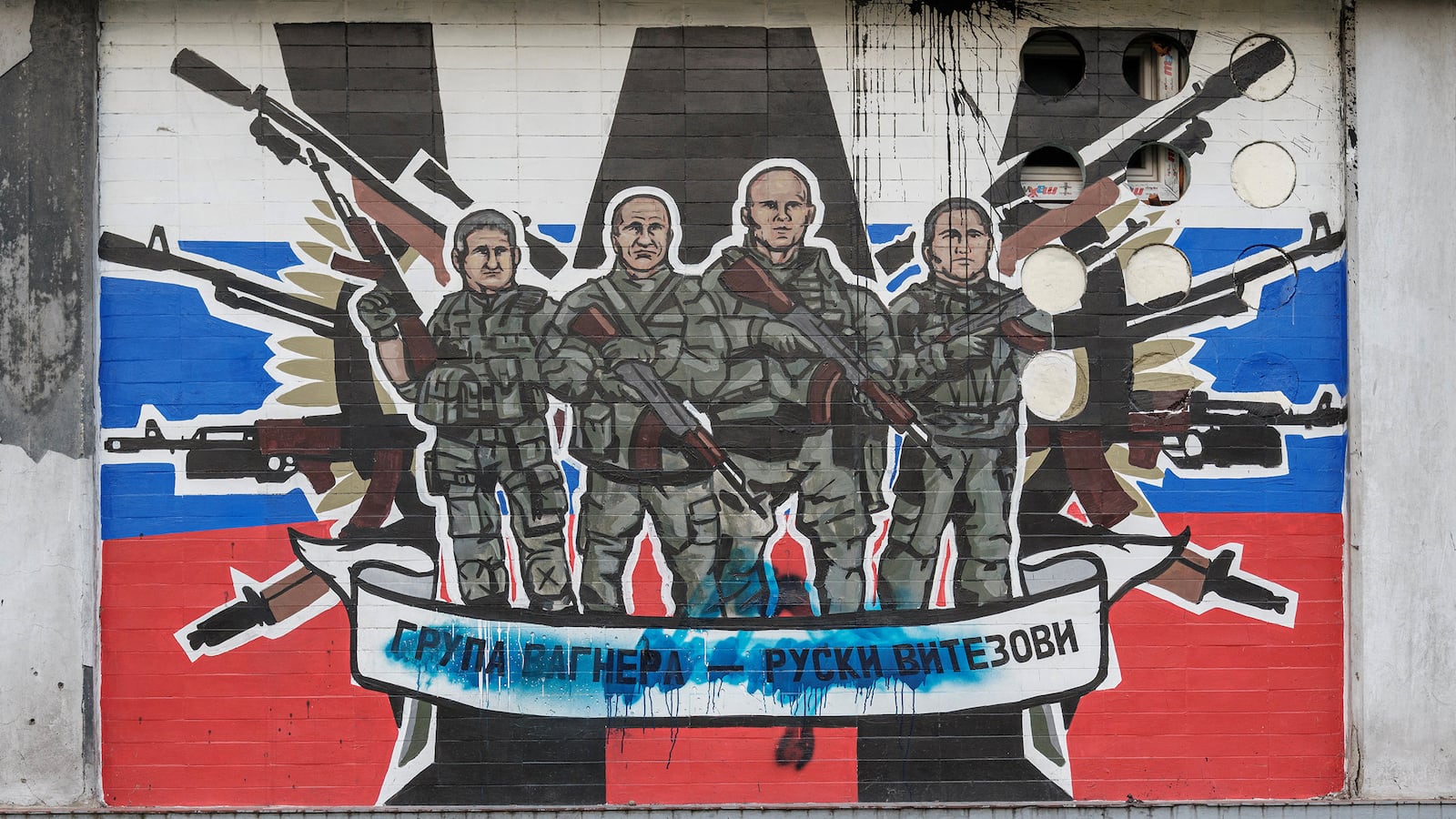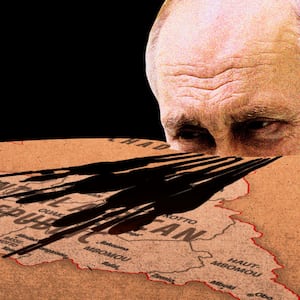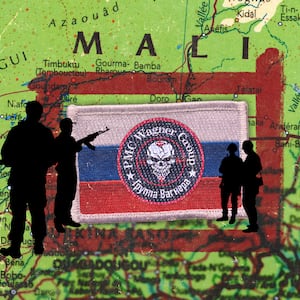GAROUA-BOULAÏ, Cameroon—Kolimba* and Bissafi* were with about a dozen of their colleagues from the Forces Armées Centrafricaines (FACA), the armed forces of the Central African Republic (CAR), at a military base in the northeastern town of Béloko when armed men attacked around 5 a.m. on Jan. 21.
The attackers, from the Coalition of Patriots for Change (CPC)—a fusion of major rebel groups in CAR—destroyed dozens of vehicles, burned fuel stocks and razed a nearby customs office, which is on the border with Cameroon. Two mercenaries from the Russian Wagner Group deployed to CAR and at least two other civilians were killed in the incident. The local soldiers, including Kolimba and Bissafi, were lucky to escape death, simply because they hid themselves rather than take on the militants.
“If we [FACA] decided to engage them in a gun battle, we would have been dead because they were more in number and better armed than us,” Kolimba told The Daily Beast. “The Russians who decided to take on the rebels were killed.”
In recent weeks, the CPC has stepped up its attacks on the Wagner Group and FACA, targeting Russian paramilitaries and Central African soldiers stationed in communities on the border with Cameroon and Chad.
Formed in December 2020 by six armed opposition groups that sought to disrupt the 2020–21 Central African general election, the CPC has gone ahead to seize a number of major towns, and even got close to capturing the capital, Bangui. But the group's advance stalled after government forces, backed by Wagner Group, mounted a counteroffensive. Despite being unable to overcome the armed forces protecting the seat of government, the CPC remains a threat to FACA and Wagner troops in other parts of the country.
Kolimba and Bissafi, who said he was almost killed in Béloko after rebels opened fire at the vehicle he was in, were happy they survived one hell—but the two men had no idea another one soon awaited them.
In the evening of Jan. 28, about a dozen Russian Wagner mercenaries, seeking to avenge the killing of their colleagues, allegedly ordered Kolimba and Bissafi to accompany them to the nearby Pendere village, where they believed CPC rebels were taking refuge, according to the two FACA soldiers. Once they arrived in Pendere, they said, the Russians began to burn down houses, shoot sporadically, and vandalize shops and storehouses.
“Several people were killed [by the Russians],” said Bissafi. "They were slaughtering people like animals."
Yassan Ndokomandji, a local hunter in Pendere, told The Daily Beast that he counted up to a dozen dead bodies littered on the streets after the incident had occurred. “The victims were men, women, and children,” he said.
At the heart of the village, the Wagner mercenaries manhandled a local Pendere chief, according to Kolimba and Bissafi, who said the chief was pushed to the ground before having his hands and feet tied with a CAR national flag.
“Somehow, the chief untied himself while no one was watching and ran into a nearby bush,” said Kolimba. “When the Russians sighted him from afar running into the bush, they fired at him but the bullets missed him.”
Confronting Wagner
According to Kolimba and Bissafi, the Russians then stormed a compound and marched men and women—who were separated from their children—out of their homes to a number of waiting pickup vehicles packed outside.
“We felt for the children who were crying when their parents were forced out of their homes, so we summoned up the courage to plead with the Russians to let the men and women go,” said Bissafi. “Unfortunately, that was when our problems began.”
Rather than listen to the plea of the local soldiers, Kolimba and Bissafi said the Wagner mercenaries turned around and accused the two men of working as spies for the rebels. Six Wagner mercenaries, they said, marched them to a nearby bush, beat them up and tied them to a tree. Hours later, under the cover of darkness, the Russians allegedly returned—and raped them.
“We tried to plead for mercy but they covered our mouths with duct tape so that we wouldn't be able to talk,” said Bissafi. “It was a painful act I've never experienced before.”
The Russians, the soldiers said, molested them for roughly half an hour, after which the Wagner mercenaries left their victims tied to the tree, with their mouths still covered with duct tape. “The following morning, a hunter who was passing by saw us in our terrible situation and rescued us,” said Bissafi.
In the last decade, abuses by armed actors have become common in CAR, which has been marked by instability and authoritarian rule since it gained independence from France in 1960. Following a coup in 2013, state institutions collapsed, and a civil war running along ethnic and religious divides broke out. The elections in 2016, which led to the emergence of President Faustin-Archange Touadéra, signaled a milestone in efforts to rebuild state institutions, but all attempts to address the fundamental problems in CAR have failed, and the country's leaders have continued to exploit the conflict for selfish political and economic gain.
The Wagner Group, which landed in the country in 2018 to help the government fight armed rebels, have contributed in plundering the nation's resources and committing grave human rights abuses.
After the incident in Pendere, Kolimba and Bissafi fled to Cameroon where they now live. Their military careers, for now, have been halted. “Our safety is what’s important for now,” said Kolimba. “We fear that we may get killed if we return [to CAR].”
It isn't the first time Wagner mercenaries would be accused of raping male FACA personnel. Roughly a month ago, Corbeau News Centrafrique, one of CAR’s best-known independent news outlets, reported that a group of Russian paramilitaries “sodomized” a CAR soldier in the central town of Digui in early January. The incident, according to the outlet, provoked the victim’s colleagues and triggered a violent clash between CAR soldiers and Wagner mercenaries, leading to the death of three Russians and four FACA soldiers.
“We’ve heard rumors in the past about the Russians raping FACA soldiers but we didn’t really believe them at the time,” said Kolimba. “It was when they assaulted us that it dawned on us that what we heard in the past might have been true.”
The Daily Beast reached out to Wagner boss Yevgeny Prigozhin for comments, but emails sent to Concord Management, a company majority-owned by Prigozhin, went unanswered.
There have been other reports of Russian-linked forces raping men and boys living in conflict zones. Last May, the United Nations said it had received reports “about sexual violence cases against men and boys in Ukraine” but feared such cases may be more common than has been officially reported because “it’s often even harder for men and boys to report” the crime.
The victims in CAR said they spoke out in the hopes that it would motivate other victims to speak out. All they want is to bring an end to the excesses of the Wagner Group.
“If we don’t expose these Russians, more people would fall victims,” said Bissafi. “Now that we’ve spoken out, other soldiers would be extremely careful when dealing with them.”
*The names of these sources have been changed for fear of retribution.







